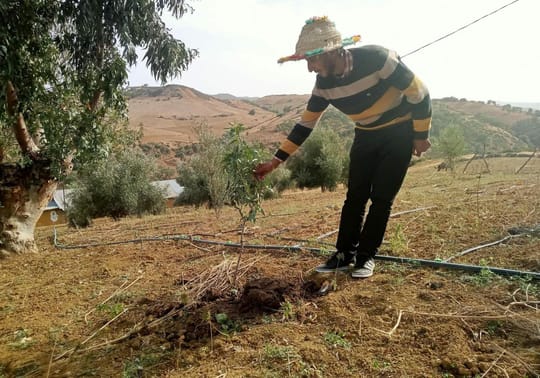Monitoring of Fruit Trees in the Fès-Meknes Region

By Abdelilah Ghmiza, Tree Monitoring Officer (YCC)

In coordination with the Al Mishaal and Rifak association, the High Atlas Foundation distributed around 2140 almond, pomegranate, olive, and fig trees in the province Fes-Meknes, benefitting more than 80 farmers from the region.
The project’s objectives are raising awareness among local community members about the importance of reforestation and its impact on the environment as well as developing the local economy by creating opportunities to generate income.
From November 14-17, a team visited the different tree planting sites and evaluated the condition of the previously planted trees.
Of the 1,100 trees that had been distributed in the commune of Nzalat Bani Aamar, 800 were in good condition. The other 300, mostly olive trees, were in need of more focused attention. In the commune of Ain Cheggag in the Sefrou province 50 fig, 50 olive, and 40 pomegranate trees had been planted. All the 140 trees were in good condition. In the commune of Ait Naamane in the El Hajeb province, 50 fig, 50 olive, and 40 pomegranate trees with an additional 30 trees yet to be planted.
In Ain Chkef in the Fès province, 300 trees had been distributed, all of which were in good condition.
Of the 200 trees that had been planted in the commune of Ait Harz Allah in the El Hajeb province, 120 were in good condition, and many of the 80 others were suffering from a lack of rainfall. Trees planted in fellow lands were affected the most.
There are plans to plant 200 trees in the Sefrou region next year.
As it can be seen in the picture, a big issue some farmers are facing is trees being damaged by grazing animals.
The team receives many requests to monitor and evaluate fruit trees from different regions of the country. This shows that farmers are aware of the importance of the process, which indicates that the High Atlas Foundation´s efforts to raise awareness for it are successful.
The main aim of the HAF remains to provide people with the support they need to help themselves. It carries out important work to improve the environment and people’s livelihoods by helping them build a sustainable and reliable source of income.